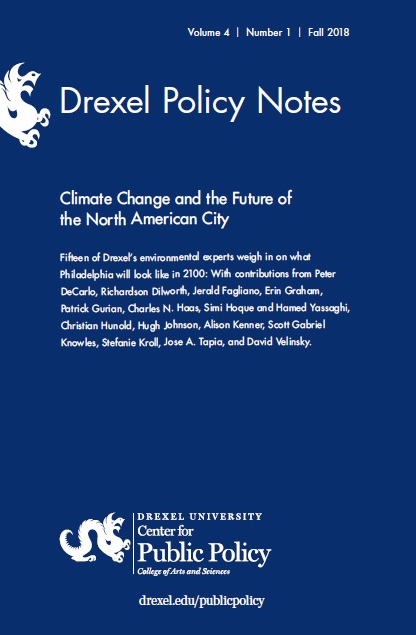What Will Philadelphia Look Like in 2100? 15 of Drexel's Environmental Experts Weigh In
December 11, 2018
The Drexel University Center for Public Policy debuted the latest edition of Drexel Policy Notes, titled Climate Change and the Future of the North American City, at the Philadelphia Citizen's Ideas We Should Steal conference on November 30, 2018. The issue brings together 15 of Drexel's environmental experts to weigh in on what Philadelphia may look like in 2100.
Contributors include faculty members from the College of Arts and Sciences Departments of Politics and of Biodiversity, Earth & Environmental Science; the College of Engineering Department of Civil, Architectural and Environmental Engineering; the Dornsife School of Public Health Department of Environmental and Occupational Health, and the AJ Drexel Institute for Energy and the Environment.
Download Drexel Policy Notes / Volume 4 / Number 1 / Fall 2018 [PDF]

Introduction: Climate Change and the Urban Future
By Richardson Dilworth, PhD
Along with the rest of the world, Philadelphia will experience fundamental, life-altering, and deeply disruptive changes over the 21st century as temperatures and sea levels rise. As the most recent report of the International Panel on Climate Change makes clear (on the basis of more than 6,000 scientific studies), these changes are now unavoidable and the only question is the extent to which rapid, coordinated, and significant global efforts to curb greenhouse gas emissions can help us avoid more devastating changes. Previous human responses to catastrophes provide some basis for hope, but the challenge of addressing climate change also begs the question of whether humanity has the capacity to meaningfully address such a profound and existential threat that is largely a product of our success as a species.
The impacts of climate vary by region, and this collection of brief essays by many of Drexel University’s environmental experts looks specifically at how climate change will affect the region in which we all live, Philadelphia, by 2100 – roughly the time when many of the authors of these essays might expect their great-grandchildren to be working-age adults.
The essays – a combination of somewhat technical forecasts combined with speculations about what life in the city will be like in 82 years – all suggest that those great-grandchildren would most likely still be able to live in Philadelphia, but that the city will be much hotter, and many of the neighborhoods along the Delaware River will no longer be habitable due to flooding or may simply be permanently under water. There will be a greater risk of diseases and of catastrophic storms, and undoubtedly there will have been significant property losses. At the same time, several authors suggest that we might experience greater demand for housing as refugees come in from places that have become uninhabitable.
As a city there are limits to what we can do to address climate change, but what we can do is not insignificant. More trees will reduce the impact of rising temperatures. Wetlands restoration will reduce the impacts of floods. Smart investments in infrastructure and new regulations such as building codes can anticipate such things as increased storms, flooding, and greater energy demands. There are of course also many things we simply don’t know and for which we thus can’t prepare. We have a limited understanding of how climate change might impact food access in our region or of the extent to which we will have to accommodate climate refugees. And we have a limited ability to predict responses to climate change at higher scales, and how those responses will affect life in specific cities.
It seems somewhat of a stretch to hope that readers might enjoy the essays herein, but our hope is that they might at least inform and inspire, either out of hope or fear – or, for better or worse, the chance to make a profit.
Richardson Dilworth, PhD, is a professor, Director of the Drexel Center for Public Policy, and Interim Department Head of Drexel’s Department of Politics. He is the author of "The Urban Origins of Suburban Autonomy" (2005) and the editor or coeditor of seven books, one of the more recent being, with Christine Palus, "The CQ Press Guide to Urban Politics and Policy in the United States" (2016).
Past issues of Drexel Policy Notes: